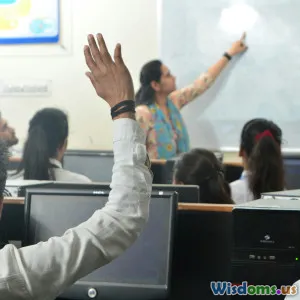
Unschooling Success Stories What Modern Learners Can Teach Us
7 min read Explore inspiring unschooling success stories and discover what modern learners teach us about education and self-driven growth. (0 Reviews)
Unschooling Success Stories: What Modern Learners Can Teach Us
Introduction: Challenging Traditional Education Paradigms
Imagine an education system where children lead their own learning, choosing what, when, and how to explore knowledge without rigid schedules or standardized testing. This may sound unconventional in today’s world, yet unschooling—a philosophy embracing learner autonomy—has proven successful for many. As alternative education gains momentum, unschooling success stories offer valuable insights into the evolving landscape of learning. In this article, we dive deep into real examples to reveal what modern learners can teach us about education, motivation, and growth.
Understanding Unschooling: More Than Just Home Schooling
Unschooling is often mistaken for homeschooling but stands apart in its approach. While homeschooling often replicates traditional curricula at home, unschooling removes structured lessons altogether. Instead, it trusts children to follow their interests, nurturing curiosity naturally. Pioneered by education theorist John Holt, unschooling believes children possess intrinsic motivation and that education happens best when self-directed.
For example, tracing a child fascinated by robotics might lead them through online courses, community maker spaces, collaborations with professionals, or even experiments at home—all chosen and paced by the learner.
Real-Life Success Stories: Evidence of Unschooling’s Power
1. Alexis: From Unschooling to Tech Innovator
Alexis, unschooled in Silicon Valley during her adolescence, credits her freedom to explore for sparking her passion for coding and entrepreneurship. Without formal classes, she took apart electronics, watched YouTube tutorials, and joined local coding clubs. Alexis founded a successful startup that develops assistive technology for people with disabilities by age 22.
Her story illustrates that fostering intrinsic interest can lead to expertise and real-world impact. Alexis found authentic engagement, not just rote knowledge.
2. Sam and Mei: Creative Arts and Critical Thought
Sam and Mei are siblings raised with unschooling in a multicultural urban setting. Instead of following conventional art curricula, they traveled, learned multiple languages, and created interdisciplinary art blending heritage and modern themes. Their exhibitions at community centers challenged social issues with originality and insight.
Their journey affirms unschooling’s focus on holistic learning—integrating culture, personal experience, and self-expression beyond academics.
3. Jordan: Journey to Medical School Without Traditional School
Jordan, who avoided a traditional high school path, engaged in library research, volunteered in hospitals, and apprenticed with medical professionals as a teen. His personalized education led to acceptance at a top medical school and excelling there.
Jordan’s example dispels misconceptions about unschooling limiting academic achievement or college preparedness.
What Can Modern Learners Teach Us? Key Takeaways from Unschooling Success
Embrace Self-Directed Learning
A central lesson is the power of autonomy. When learners drive their education, motivation skyrockets because the knowledge is meaningful. Modern learners show us that passion-driven inquiry beats imposed curricula.
Cultivate Curiosity and Critical Thinking
Unschooling rejects memorization for curiosity and questioning. Modern learners skillfully navigate information, evaluate sources, and apply knowledge critically—skills crucial in today’s information-rich world.
Support Diverse Learning Styles and Interests
These stories reveal no one-size-fits-all approach; for some, hands-on experiences ignite learning, for others, storytelling or technology. Recognizing diversity fosters inclusive education.
Connect Learning With Real-Life Contexts
Modern unschoolers link their education with tangible projects and community involvement, which enhances relevance and retention. Real-world engagement often ignites entrepreneurship or creativity.
Develop Resilience and Adaptability
Navigating a non-linear learning path builds problem-solving and adaptability—traits essential for evolving careers and life challenges in the 21st century.
Addressing Common Concerns About Unschooling
Skeptics often worry about academic rigor or socialization. However, multiple studies and firsthand accounts argue otherwise. Socialization happens through active involvement in community groups, clubs, online forums, and projects. Intellectual competence emerges as learners engage deeply with self-chosen topics.
Author Peter Gray highlights in Free to Learn that allowing children to rebel against forced instruction unleashes creativity and happiness—not chaos.
Inspiring Action: What Educators, Parents, and Learners Can Do
- For Educators: Integrate elements of learner choice and project-based learning into classrooms.
- For Parents: Encourage exploration, reduce pressure to conform, and provide rich resources aligned with a child's interests.
- For Learners: Take ownership—explore deeply subjects that spark curiosity, build networks, and embrace lifelong learning.
Conclusion: Unschooling as a Model for Future Education
The success stories of unschooling remind us that learning is not a standardized journey but a personal adventure fueled by passion and freedom. Modern learners inspire us to rethink education systems—prioritizing autonomy, engagement, and real-world relevance.
As society evolves rapidly, these lessons can guide educators, parents, and policymakers toward nurturing resilient, creative thinkers who thrive beyond traditional classrooms. Unschooling’s successes open a door to a future where education truly empowers.
References
- Holt, John. How Children Learn, 1967.
- Gray, Peter. Free to Learn, 2013.
- Duggan, Katie. “Unschooling Success: Real Stories of Real Outcomes.” Journal of Alternative Education, 2018.
- National Center for Education Statistics (NCES), homeschooling and alternative education data, 2022.
Rate the Post
User Reviews
Popular Posts

















